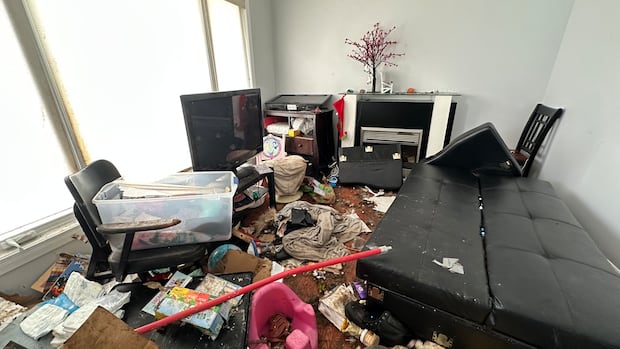Feces, urine, mould: After 1-year eviction fight, Hamilton landlord gets back home needing $100K in fixes
Verica Grgic got LTB order to evict tenant last week over $25K in unpaid rent
The small, tidy Hamilton bungalow where Verica Grgic once raised her kids is destroyed.
The hardwood floors are coated with dog feces, with some of the excrement growing mould in the kitchen. The living room is strewn with belongings and garbage, dog toys and a mangled cat stand. The front wall and window are sprayed and streaked with what looks like blood. A pungent ammonia-like odour permeates the home.
Grgic and her husband, Marinko Vrbanic, showed CBC Hamilton the state of their Stoney Creek house a day after they got permission from Ontario's Landlord and Tenant Board (LTB) to evict the tenant for not paying over $24,000 in rent.
It was an order Grgic had been attempting to get for a full year. She served the tenant an N4 notice in early 2024, applied to the LTB that March and was granted the eviction order in July, but then had to wait until last week to finally be allowed to change the locks.
"I'm not exaggerating — this was the worst year of my life," said Grgic. "I am so disgusted. I would never believe this is the real system, but I learned the reality."

Grgic said a contractor has determined the drywall, flooring and subflooring, and appliances will all need to be replaced, in part to get rid of the smell, exceeding an estimated $100,000.
The tenant did not respond to multiple phone calls, texts, social media messages or emails to her personally or to her business requesting a comment before and after she was evicted last week. CBC Hamilton also reached out to the Advocacy Centre for Tenants Ontario (ACTO).
Douglas Kwan, ACTO's advocacy and legal services director, said generally speaking, it's outside the norm for tenants to not pay rent. He declined to comment on this specific case.
Previous evictions of tenant found at LTB
For Grgic, 47, the experience has cost her more than money.
She immigrated to Canada from Croatia as a single parent of two and worked long hours as a personal support worker. She bought the bungalow 14 years ago on her own. When she and Vrbanic, 59, got married last year, they decided to live in his place and rent out hers.
"It's actually more of a sentimental value than money," he said.

After the tenant applied to rent it, her references checked out, Vrbanic said, although they didn't look at her credit history or request the LTB provide any past decisions involving her. She paid first and last month's rent in November 2023. But from there, the situation unravelled, rent went unpaid and Grgic said she watched her home being "destroyed."
Vrbanic later discovered on the website Openroom — a crowdsourced online database of orders — that the tenant had been evicted in 2020 and 2022 from two other Hamilton homes for not paying rent. In each case, she owed the landlords more than $15,000, according to those LTB decisions.
Small landlords across Ontario have told CBC News in recent years they've fallen victim to tenants who know how to use the LTB to their advantage. Landlords say these tenants intentionally drag out proceedings for months while not paying rent and, in some cases, destroy property.
A landlord in Oshawa said he wasn't allowed to evict a tenant from his rental property for months even after a fire started inside it. Another landlord, in Ottawa, was left with holes in the walls, broken lights and faucets, a clogged toilet and other issues when a tenant, who didn't pay rent for 11 months, was finally evicted.
Grgic said the "destruction" to her house could've been avoided if she'd been allowed to evict the tenant last summer. She said she's speaking out to warn other small landlords about the challenges in the system.
"Nobody cares," she said. "You're just on your own."
Animal welfare investigation ongoing
Last August, the tenant successfully requested the LTB review the July eviction order because she said she didn't know about the hearing, according to the tribunal's final decision last week.

The board had sent the hearing information to an email for the legal clinic helping her with the case, but the tenant said she didn't receive it, the decision said.
A new hearing took place in late October, but the tenant also didn't attend, the decision said. An eviction order was reissued for November. The tenant requested a review of that one too, writing in a letter to the LTB she also hadn't received that notice and she'd "certainly become homeless" if evicted. The eviction order was stayed again.

Grgic and Vrbanic said they emailed the tenant the hearing information.
Meanwhile, conditions in the home were rapidly deteriorating, Grgic said. They had issues gaining access to do inspections as they feared getting attacked by three dogs inside. Grgic said the dogs and a cat were left alone in the home beginning around September.
Neighbour Josie Sorbara could hear the dogs "barking all the time" and would see them pawing at the front window, the 86-year-old told CBC Hamilton. Grgic said neighbours also reported a dog fight to her and blood was smeared on the front window.
Then there was a flood.
A tenant living in the basement unit notified Grgic as water began to pool in the ceiling.
Grgic and her husband entered the house with police, as captured in a video seen by CBC Hamilton. Animal Welfare Services, a provincial agency, temporarily secured the dogs so they could get inside, said Grgic.
They found a pipe had been removed from under the bathroom sink and the faucet left on, causing water to seep into other rooms and the basement unit below, said Vrbanic.
"All that poop and pee from the dogs with the water mixed and coming down through the ceiling, insulation, vents, lights — it was just a disaster," said Vrbanic.
The water and electricity had to be shut off for safety reasons, he said.
The basement tenant moved out after the flood, and Grgic regained possession of that unit in February, according to a LTB eviction order.

The dogs and cat continued to stay in the upstairs unit for another week until animal services took them away, she said.
The Ministry of the Solicitor General, which enforces animal welfare laws in the province, said that as of last week, the investigation is ongoing and it would be inappropriate to comment.
Expedited hearing request denied
Grgic tried to get an expedited hearing for the case against the main floor tenant in December, arguing without possession of the home, she couldn't address the flood damage, such as mould and mildew.
That request was denied.
"If the unit is damaged beyond repair, there is no issue in the unit that will become irreparable; it is already irreparable," wrote adjudicator Renée Lang on Jan. 2.
The final hearing took place on March 18 and the tenant didn't appear, the decision said.

Grgic was allowed to change the locks last week. She's decided to not pursue damages in small claims court as she's doubtful she'd be repaid if she won.
The couple said their next steps will be to gut the house. Then they'll wait to see if their insurance will cover any of the repairs as their case is currently being reviewed. Otherwise, they'll have to renovate it step by step, like Grgic did when she first moved in.
Beyond that, they don't know if they'll ever rent it out again unless the LTB changes how it handles eviction cases.
Length of LTB process 'inexcusable,' says advocate
Tribunals Ontario, which oversees the LTB, did not comment on this case specifically, but said in an email that over half the applications filed are to evict tenants accused of not paying rent.
In recent years, the LTB has shortened the amount of time it takes to get an order, said spokesperson Veronica Spada. In 2023, landlords typically had to wait eight to 10 months for a hearing, and now wait about three months, she said.
That wait estimate doesn't take into account if a tenant requests a review and a new hearing needs to take place, or how long it takes for the adjudicators to issue their orders.
The LTB process still takes an "inexcusable" amount of time, said Kathy Laird, a lawyer with Tribunal Watch Ontario, a public interest group that monitors the province's tribunal system. Waiting a year, as Grgic did, is "not good, it's not good at all," Laird said.
Before 2018, the LTB was able to deal with eviction cases from start to finish within two months, said Laird, who's worked as an adjudicator on several other Ontario tribunals. If a tenant missed a hearing, another could be scheduled the next day.
After the Doug Ford government took power in 2018, experienced adjudicators left and "efficient" in-person hearings were switched to virtual hearings over the course of the pandemic, all of which slowed down the process, she said.
"This is really hurting landlords and also tenants."
Laird noted 40 per cent of Ontario residents are tenants and the vast majority pay their rent on time.
But the LTB should be able to deal with egregious cases quickly so landlords can take possession, do repairs and find new tenants who need housing as soon as possible, Laird said.
"The quality of service from the tribunal has deteriorated astoundingly. Nothing is working efficiently."



